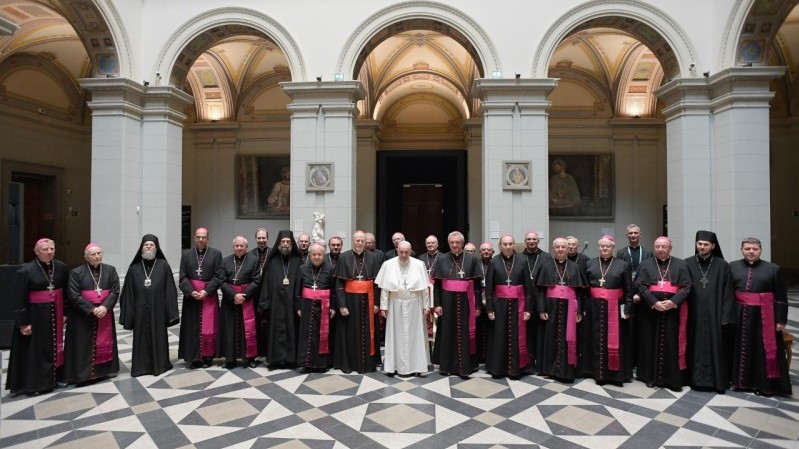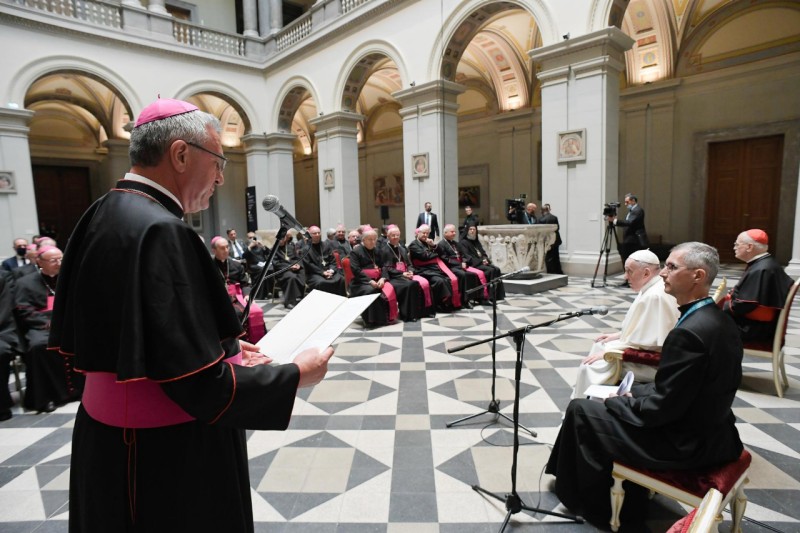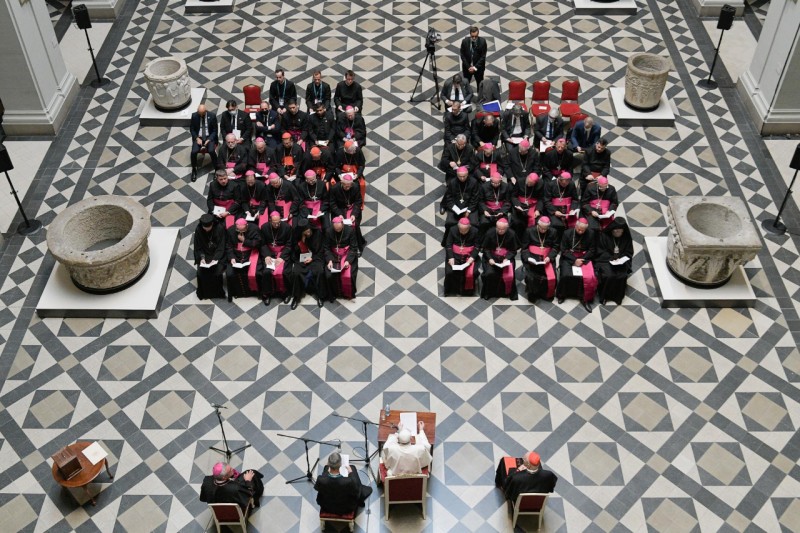On September 12, 2021, as Pope Francis began his apostolic visit to Budapest and Slovakia, he met with the Catholic bishops of Hungary in the Museum of Fine Arts in Budapest.
Here is the address he delivered to his brother bishops on this occasion:
Pope Francis' address to the bishops of Hungary
Museum of Fine Arts (Budapest)
Sunday, 12 September 2021
Dear Brother Bishops: good morning!
I am very happy to join you for the conclusion of the 52nd International Eucharistic Congress. I thank Bishop András Veres for his kind words and for the very beautiful gift presented on behalf of all of you – very beautiful, thank you. I greet all of you with gratitude for your welcome and for your support of this event, which reminds us of the centrality of the Eucharist in the life of the Church.
I would like to share a few thoughts inspired by the Eucharistic action itself. In the consecrated Bread and Wine, we see Christ who offers his body and his blood for us. In a particular way, the Church in Hungary, with its long history of unwavering faith, persecutions and the blood shed by its martyrs, has been associated with Christ’s sacrifice. How many of our brothers and sisters, bishops and priests, experienced in their lives what they celebrated on the altar! They were crushed like grains of wheat, in order to fill others with the love of God; they were pressed like grapes, so that the blood of Christ could become a source of new life; they were broken, but their loving sacrifice was an evangelical seed of rebirth sown in the history of your people.
As we look back on this history of martyrdom and of sacrifice, we can also look to the future, sharing the same desire of the martyrs: to exercise charity and to bear witness to the Gospel. In the life of the Church, these two things must remain inseparable:
preserving the past and looking to the future. Preserving our religious roots and our past history, while not keeping our gaze fixed only on the past, and looking to the future, looking forward to find ever new ways to proclaim the Gospel.
I have vivid memories of the Hungarian sisters of the Congregation of Jesus (“the English Ladies”), who had to leave their homeland due to religious persecution. With typical strength of character and fidelity to their vocation, they established Maria Ward College in the city of Plátanos, near the capital (Buenos Aires). From their strength, their courage, their patience and their love for their native land, I learned much; for me they were a powerful witness. Remembering them here today, I also pay tribute to all those men and women who were forced into exile and to all those who gave their lives for their country and for the faith.
As Bishops, you are called in the first place to remind your people that the Christian tradition, as
Benedict XVI told us, “is not a collection of things or words, like a box of dead things. Tradition is the river of new life that flows from the origins, from Christ down to us, and makes us participate in God’s history with humanity” (
General Audience, 3 May 2006). For the theme of this Congress, you chose a verse from Psalm 88: “All my springs are in you”. Indeed, the Church herself flows from the wellspring which is Christ, and is sent forth so that the Gospel, as a stream of living water infinitely more vast and welcoming than your great Danube, may refresh the deserts present in our world and in the human heart, to purify and quench every thirst. As Bishops, your ministry is not to repeat a message from days of yore, but to be a prophetic voice loudly proclaiming the perennial timeliness of the Gospel in the life of the holy people of God and in today’s world.
I would like to suggest a few pointers for carrying out this mission.
On September 12, 2021, Pope Francis met with the Catholic bishops of Hungary in the Museum of Fine Arts in Budapest. Photo courtesy of Vatican Media.
First,
be heralds of the Gospel. Let us not forget that the heart of the Church’s life is our encounter with Christ. Sometimes, especially when society around us is less than enthusiastic about the Christian message, we can be tempted to retreat into a defence of our institutions and structures. Your country today is caught up in the great changes affecting Europe as a whole. After the long years when the practice of the faith met with opposition, the growth of freedom has brought new challenges, with the advance of secularism and a lessened thirst for God. Let us not forget: Christ is an ever-flowing spring of water that quenches every thirst. Structures, institutions and the Church’s presence in society are meant to awaken in men and women the thirst for God and to offer them the living water of the Gospel. As Bishops, you are not called to be primarily bureaucrats and managers; other people can fulfil these tasks. Nor are you called to seek privileges and benefits. Please be servants. Servants, not princes. What is it I am asking of you? To demonstrate a burning passion for the Gospel. Fidelity and passion for the Gospel. Be witnesses and preachers of the Good News, abounding in joy, close to your priests – close to your priests – and religious with the heart of a father, ever ready to lend a listening ear.
Allow me to depart from my text and remind you of the four kinds of closeness that a Bishop should have. First is closeness to God. As a brother, I ask you: do you pray? Or only recite the Breviary? Do you pray from the heart? Do you take time to pray? “But I am so busy…”. Yet in the multitude of things to do every day, make time to pray.
Second, closeness among yourselves. The Episcopal Conference, fraternity among the Bishops, is a grace. None of you thinks the same as the other: this is a treasure. Try to express your differences within the unity of the episcopate rather than give rise to factions. We are all brothers. You think differently from me, but you are a brother. Do we need to discuss? Let’s discuss. Do we need to shout? Let’s shout. But as brothers. What should not be harmed is the unity of the Episcopal Conference. This is a grace: we must ask for it. It means preserving (the unity of) the people of God within the unity of the Bishops.
The third kind of closeness is one I have mentioned: closeness to your priests. The priest is “the closest neighbour” of the Bishop. I will tell you something that saddens me a great deal. In some dioceses, both in my own country when I was there in my previous diocese, and now that I am in Rome, there are priests who complain; they can be difficult, but they complain because they feel a need, they need to talk to the Bishop. They say this. And many times I have heard priests say: “I called and the secretary said that the Bishop is too busy, that he checked and then said to me, ‘Maybe in three weeks he will give you an appointment for fifteen minutes’”. And the priest says, “No, thank you, I don’t want that”, or he says, “All right”. This should not be. The priest feels his Bishop is distant, he does not feel that the Bishop is his
father. I will give you some advice, as a brother: when you go back to your residence tired after a mission or after visiting a parish, and you see that a priest has called, call him back: either the same day, or at most the next day, but not later than that. Closeness. That priest, if he is called right away, knows that he has a
father. This is very important. Closeness to your priests, and this means also closeness to your religious. “Yes, but you know, this priest is difficult…”. Yet tell me, what father does not have a difficult son? All fathers have them. Sons should be loved as they are, not as I would like them to be.
Lastly, closeness to the holy and faithful people of God. Please do not forget your people, from whom the Lord took you. “I took you from the flock”: do not forget the flock from which you have been taken. What does Paul recommend to Timothy? “Remember your mother and your grandmother, your people”. The author of the Letter to the Hebrews said: “Remember those who raised you in the faith”. How many humble catechists, how many grandmothers are behind us. May your hearts be close to your people. It is not good when the heart of a Bishop is far from his people.
The four kinds of closeness. Make an examination of conscience on how they are going. I think well, but I would like to repeat them. Closeness to God, closeness among yourselves – I see some here with their own particular historical and liturgical traditions and differences: be close to their liturgy, their history, without wanting to impinge on them or Latinize them: no, please, no. Closeness among yourselves, closeness to your priests and closeness to the holy and faithful people of God. Being a Bishop nowadays – in every period, but I would emphasize nowadays – requires the art of listening. And this is not easy. Do not be afraid to give priority to the word of God and to involve the laity: they will be the streams by which Hungary will once again be watered by the river of faith.
Second,
be witnesses of fraternity. Your country is a place where men and women from other peoples have long lived together. Various ethnic groups, minorities, religious confessions and migrants have made yours a multicultural country. This is something new and, at least initially, can be troubling. Diversity always proves a bit frightening, for it challenges our securities and the status quo. Yet it also provides a precious opportunity to open our hearts to the Gospel message: “Love one another as I have loved you” (
Jn 15:12). In the face of cultural, ethnic, political and religious diversity, we can either retreat into a rigid defense of our supposed identity, or become open to encountering others and cultivating together the dream of a fraternal society. I recall with pleasure that in 2017, here in this European capital, you assembled with representatives of the other Episcopal Conferences of Central and Eastern Europe to affirm once again that attachment to one’s own identity must never become a motive of hostility and contempt for others, but rather an aid to dialogue with different cultures. Dialogue without negotiating away one’s own attachment.
Above the great river passing through this city stands the imposing Chain Bridge, which replaced an unsteady wooden bridge and served to unite Buda and Pest. If we want the river of the Gospel, also here in Hungary, to penetrate people’s lives and lead to a more fraternal and solidary society, the Church needs to build
new bridges of dialogue. I ask you, as Bishops, together with your priests and pastoral workers, always to show the true face of the Church: she is a mother. A mother! A face that is welcoming to all, including those coming from elsewhere, one that is fraternal and open to dialogue. Be shepherds who take fraternity to heart, not lording it over the flock but acting as fathers and brothers. May the “style” of fraternity, which I ask you to cultivate with your priests and with the whole people of God, become a luminous sign for Hungary. This will help shape a Church in which the laity, in every aspect of their daily lives, the lives of their families, the life of society and the workplace, will be a leaven of evangelical fraternity. May the Church in Hungary be a builder of bridges and an advocate of dialogue!
On September 12, 2021, Pope Francis met with the Catholic bishops of Hungary in the Museum of Fine Arts in Budapest. Photo courtesy of Vatican Media.
Finally, a third point:
be builders of hope. If we put the Gospel at the centre and bear witness to it with fraternal love, we will be able to look to the future with hope, whatever the tempests, great or small, we may experience today. What is the Church called to bring to the lives of all men and women, if not the serene certainty that God is mercy, that he loves us at every moment of our lives and is ever ready to forgive us and lift us up? Remember God’s style, which is a style of closeness, compassion and tender love. This is God’s style. Let us travel the same path, with the same style. Temptation to discouragement never comes from God, never. It comes from the enemy, and can be fueled by any number of situations: behind the façade of prosperity, or under the guise of religious traditions, many dark areas can lurk. The Church in Hungary has recently had cause to reflect on how the transition from the age of dictatorship to that of recovered freedom has had its contradictions: a decline in morality and a surge in organized crime, the narcotics trade and even organ trafficking, and so many cases of children killed for this purpose. There are social problems: the troubles experienced by families, poverty, the problems faced by young people, all in a context where democracy remains to be solidly established. The Church must not fail to be an advocate of closeness, a source of care and consolation, lest people end up being robbed of the light of hope. The preaching of the Gospel reinvigorates hope because it reminds us that in everything God is present; he accompanies us and gives us the courage and creativity we need to start ever anew. It is moving to think of Venerable Cardinal József Mindszenty, a son and father of this Church and of this land, who at the end of a life filled with sufferings born of persecution left us these words of hope: “God is young. The future is in his hands. He calls forth whatever is new, young and promising in individuals and in peoples. So we can never yield to despair” (
Message to the President of the Organizing Committee and to Hungarians in Exile, in J. Közi Horváth,
Mindszenty bíboros, 111). God is young.
In the face of crises, whether social or ecclesial, may you always be advocates of hope. As the Bishops of this country, always speak words of encouragement. May you never speak in ways that increase distances or impose judgements, but in ways that help God’s people to look confidently to the future, that help individuals to live lives of freedom and responsibility. Life is a gift of grace to be welcomed, not a riddle to be solved. The cube invented by your famous architect Rubik is a fascinating game, not a model for how to live our lives!
Remember: you are shepherds of the flock. The shepherd must be
within the flock: at its head to show the way, in its midst to appreciate its odour, behind it to help those who are lagging and also to let the flock go a little forward, for it has a particular sense of where good and nourishing pastures are to be found.
Dear brothers, Hungary too needs a renewed preaching of the Gospel, a new social and religious fraternity, a daily-renewed hope that enables us to look to the future with joy. As Bishops, you are called to play a leading role in this historical process, this wonderful adventure. My brothers, may God confirm you in the joy of mission! I thank you for everything that you are doing and I grant you my heartfelt blessing. May Our Lady protect you and Saint Joseph watch over you. And, if you have some time, pray for the Pope. Thank you.
Text courtesy of Libreria Editrice Vaticana (click here for original source)

















